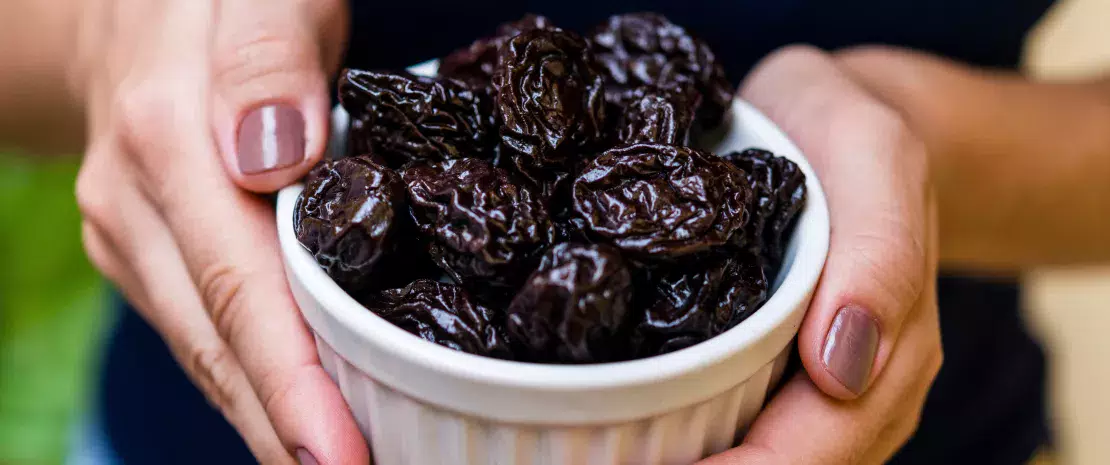Addicted to prunes? Your microbiota and your health will thank you!
The health benefits of prunes in postmenopausal women appear to be linked to their positive effects on the gut microbiota, according to a study conducted by American researchers 1.
- Learn all about microbiota
- Microbiota and related conditions
- Act on your microbiota
- Publications
- About the Institute
Healthcare professionals section
Find here your dedicated section
Sources
This article is based on scientific information

About this article
Delicious; rich in fiber and antioxidants; good for bowel function, the heart, the blood vessels, and bone health; excellent allies for weight loss... In terms of health benefits, prunes get two thumbs up!
Prunes: Their mode of action is still a mystery…
The inclusion of these dried fruits in the diet of postmenopausal women is no exception to the rule. The health benefits of prunes for postmenopausal women, particularly in improving bone health, are well documented, but there are many unknowns surrounding how they work, particularly when it comes to the role of the gut microbiota.
What exactly are the effects of these dried fruits on the gut bacteria during menopause? A team of American researchers has tried to answer this question.
They recruited 143 postmenopausal women aged 55 to 75 and randomly assigned them to 3 different groups:
- one in which they had to eat 4 to 6 prunes per day (50 g),
- another in which they had to eat 10 to 12 prunes per day (100 g)
- and a third in which they did not eat any prunes (control group).
Before and after the experiment, the scientists collected stool samples from the volunteers to analyze and compare the evolution of their microbiota.
Osteoporosis: 3 prunes a day may keep the orthopedic surgeon away!
Osteoporosis after menopause affects one in three women. Could prunes be an ally in the fight against this widespread problem? A review 2 of studies conducted on this subject suggests that they could. According to its authors, eating prunes regularly could:
- prevent and reduce bone loss,
- improve bone mineral density and bone biomarkers,
- have anti-inflammatory effects (which is useful, given that inflammation is a risk factor for osteoporosis!),
- suppress the production of cytokines (the body’s pro-inflammatory messengers),
- increase antioxidant enzymes (which combat the oxidative effects of inflammation).
More beneficial gut bacteria
They also collected blood and urine samples to measure inflammatory markers (a risk factor for many diseases) and “phenolic metabolites.”
Phenolic metabolites are beneficial compounds derived from the breakdown of antioxidants (polyphenols). The level of urinary phenolic metabolites reflects the level of activity of the microbiota bacteria that break down polyphenols.
After 12 months of the experiment, the results indicate that women in the “prune” groups show significant changes in their microbiota compared to those in the control group. These changes are different depending on the dose (50 or 100 g).
In particular, the researchers’ analyses show an enrichment in bacteria of the Lachnospiraceae family, already known for their capacity to maintain the intestinal barrier.
Anti-inflammatory effects mediated by the microbiota
It appears from the study that Lachnospiraceae are able to metabolize prune polyphenols and ferment their fibers to produce (sidenote: Short chain fatty acids (SCFA) Short chain fatty acids (SCFA) are a source of energy (fuel) for an individual’s cells. They interact with the immune system and are involved in communication between the intestine and the brain. Silva YP, Bernardi A, Frozza RL. The Role of Short-Chain Fatty Acids From Gut Microbiota in Gut-Brain Communication. Front Endocrinol (Lausanne). 2020;11:25. ) that have anti-inflammatory properties. Calculations show that the presence of some of these bacteria is negatively correlated with inflammatory markers and positively correlated with phenolic metabolites.
According to the researchers, by providing fiber and polyphenols, prunes exert a selection pressure that favors good bacteria in the long term, which could explain their health benefits.
Remember that if you have a sugar craving!















